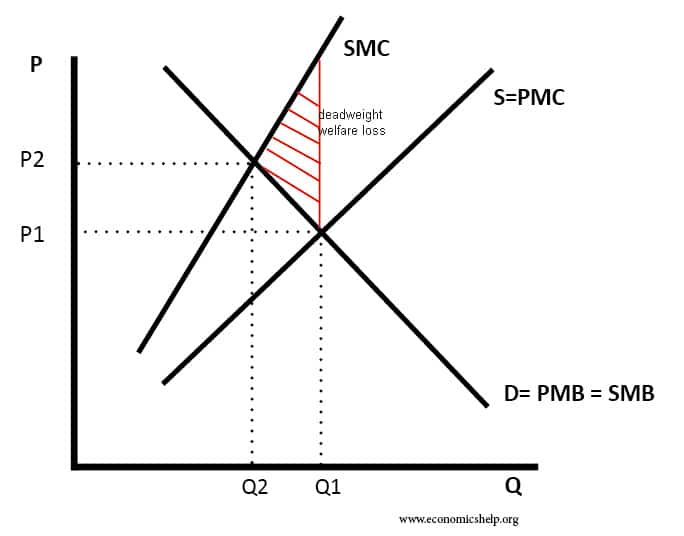An important principle in economics is the idea of taxing goods with negative externalities (goods which impose external costs on the rest of society)
Usually, in a free market, we ignore the external costs of our consumption. We only face the private costs. But, this leads to overconsumption of these goods and a deadweight welfare loss to society.
For example, if we decide to drive a car to work at peak rush hour, then we face private costs, such as the cost of petrol and the time taken. However, our decision to drive to work imposes an external cost on the rest of society
- Congestion is increased. Increasing the journey time for everyone
- More pollution from standing in traffic jams causing pollution.
The economic solution is to make people pay the full social cost of driving into a city centre. If we face the true social cost (private cost + external cost) some will reduce their demand and we will get a more socially efficient level of driving into the city centre. This tax (congestion charge) may be politically unpopular but it makes economic sense:
- It raises revenue
- Journey times are increased. Business costs are reduced.
- It attains a more socially efficient level of driving.
If you seek to maximise economic welfare, it makes more sense to impose taxes on goods with negative externalities rather than just general taxation. If it makes sense to tax driving into city centres, why not tax everything that has a negative externality?
Tax on Swearing
When I started teaching at a rather laissez-faire style tutorial college in Oxford, I was shocked that students would frequently swear in lessons. So I instituted my own tax. 10p fine for every swear word. It was to illustrate that in my economic class, swear words were a demerit good with negative externalities (it caused me pain to hear them), and I was the government intervention.
Generally, this proved a very good policy. Demand was generally very inelastic, and rather than pay 10p, the quantity of swearing fell dramatically.
The only failure was with the son of a Russian Oligarch, who thought this was tremendously funny, and actually increased his swearing so he could pay more fines. (I suppose, this is a very unusual example of a Veblen good) He once gave a £20 note in advance credit for swearing throughout the next week. At this point, I decided I needed a bit of price discrimination and students, with more money than sense, would have to pay a higher rate of swear tax.
You might say, I should just have banned swearing, but it was more fun to raise revenue and illustrate the concepts of negative externalities and taxation. At 10p I was indifferent to the pain of hearing a swear word versus the increased income. (At the end of the week, my swear money could often buy a mug of tea, that my paltry wage failed to do…. the things economic teachers will do to increase their income..)
Does this mean the government should tax every annoying behaviour?
Why should we stop at swear words, why not tax people who have irritating ring tones going off on trains? or tax people who don’t have a shower every day?
Obviously, we need a degree of common sense. It has to be borne in mind, imposing taxes on goods incur
- Costs of administration
- Cost of feeling we are living in an intrusive society.
- Debate about how bad the external cost is.
A tax on an irritating ring tone would be more hassle than it’s worth. It would not increase economic welfare to have armies of policy handing out 10p tickets every time you let go of an exclamation.
However, in the case of congestion, people can see the social costs – traffic jams e.t.c. In this case, a congestion charge can have a big enough improvement in economic welfare to compensate for the administration costs and interference of imposing a tax.
So Pigovian taxes should not extend as far as fines for swearing (except in my economic lessons). But, social welfare could definitely be extended by being more willing to impose taxes on goods with significant external costs.
Related


Should we tax swearing? That’s less of a joke than you might think: it’s actually illegal in Britain to insult anyone under Section 5 of the Public Order Act. “Reform of Section 5” are currently campaigning to abolish this absurdity. See:
http://reformsection5.org.uk/
Now why would politicians / police want the right to arrest anyone for an “offence” which is almost impossible to define? Well it gives them the power of arbitrary arrest. To put it bluntely, there are plenty of little Hitlers in Westminster.
Moreover, twice as many Labour MPs want section 5 retained as Tory MPs. (See the survey done at the above link.) Makes you wonder where the closet fascists are nowadays: the political left or the political right.